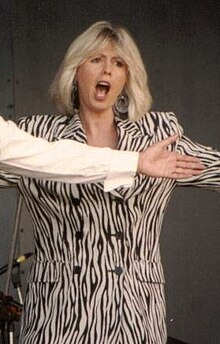| Sandra Stevens | |
|---|---|
 Sandra Stevens Sandra Stevens | |
| Background information | |
| Born | (1944-11-23) 23 November 1944 (age 80) Leeds, Yorkshire, England |
| Genres | Pop music |
| Occupation | Singer |
| Instrument | Vocals |
| Years active | 1966–present |
| Labels | Pye, EMI, Dawn, Warwick |
Sandra Stevens (born 23 November 1944) is an English singer and a member of the pop group Brotherhood of Man.
Early career
Sandra Stevens first entered into a singing career in the 1960s when she joined the club band, The Track (who then changed their name to The Nocturnes). The group was formed by drummer Ross Mitchell and among the six members Stevens sang vocals alongside Eve Graham (later of The New Seekers). Based in Manchester, the band played local clubs, performing pop hits of the day such as "The Loco-Motion" and "Da Doo Ron Ron". In early 1967 Stevens decided to leave the group and was replaced by Lyn Paul (also later of The New Seekers). Over the next few years she sang with the big bands of Joe Loss and Ken MacKintosh and also joined another group, Jason Flocks. Also at this time Stevens was working during the day as a shorthand typist.
Brotherhood of Man
In 1973, Stevens was performing as the resident singer at the Wakefield Theatre when she came to the attention of Tony Hiller who was looking to recruit a new singer for Brotherhood of Man – a group he was managing. The group were currently performing as a trio (Martin Lee, Lee Sheriden and Nicky Stevens (no relation)) and had released two singles. Stevens took the two singles and listened to them, immediately she was taken by the sound and was keen to join them. In late 1973 Brotherhood of Man became a four-piece with Sandra sharing lead vocals.
It was not long before the group released their first single featuring the new line up. In January 1974 "When Love Catches Up on You" was released on Dawn Records and by the end of the year they had scored a European hit with "Lady" and had released an album.
Over the next few years, Stevens enjoyed great success with Brotherhood of Man throughout the world. In 1975 they scored their first number one single and a year later they won the Eurovision Song Contest with the song "Save Your Kisses for Me". The song made No.1 in the UK as well as many other countries and this was followed by two more UK chart toppers, "Angelo" and "Figaro". Although Hiller, Sheriden and Lee wrote the bulk of their material, Stevens is credited as a co-writer on one of their songs: "Let's Love Together", the B-side to "Save Your Kisses for Me". In over 100 songs recorded, this is the only time that one of the female members of the group received a writing credit.
Stevens continued with Brotherhood of Man, recording lead vocals for many of their biggest hits and performing live with them through the decades. The group continued with the same line-up. They appeared in concert and on television, until 20 October 2020, when they retired from touring.
Personal life
During the peak of the group's success, Stevens was in a relationship with fellow band member Martin Lee and moved in with him. Due to the young age of many of the group's fans, this was kept largely a secret. Stevens and Lee later married.
References
- The New Seekers.com. "The Track/The Nocturnes with early photo of Stevens". Retrieved 15 February 2009.
- Lyn Paul. "The Nocturnes info". Retrieved 15 February 2009.
- Keithm. "Joe Loss and Ken McIntosh bands". Archived from the original on 3 August 2012. Retrieved 15 October 2008.
- Look-In 1977 No.34. "Brotherhood of Man feature". Archived from the original on 26 October 2009. Retrieved 2 January 2009.
{{cite web}}: CS1 maint: numeric names: authors list (link) - Official website. "Brotherhood of Man biography". Retrieved 1 September 2008.
- Radio 538 – Netherlands. ""Lady" – Dutch charts". Archived from the original on 11 March 2009. Retrieved 19 September 2008.
{{cite web}}: CS1 maint: numeric names: authors list (link) - The Eurovision Song Contest – The Official History. O'Connor, John Kennedy. Carlton Books 2007 ISBN 978-1-84442-994-3
- Official Charts. ""Angelo" at No.1". Retrieved 4 October 2008.
- Official Charts. ""Figaro" at No.1". Retrieved 4 October 2008.
- Official website. "Concert details". Retrieved 14 October 2008.
- Metro.co.uk. "Lee Sheriden interview". Retrieved 4 February 2009.
| Awards and achievements | ||
|---|---|---|
| Preceded by with "Ding-A-Dong" |
Winner of the Eurovision Song Contest 1976 (as part of Brotherhood of Man) |
Succeeded by with "L'oiseau et l'enfant" |
| Preceded byThe Shadows with "Let Me Be the One" |
UK in the Eurovision Song Contest 1976 (as part of Brotherhood of Man) |
Succeeded byLynsey de Paul and Mike Moran with "Rock Bottom" |
| Brotherhood of Man | |
|---|---|
| Singles |
|
| Albums |
|
| Related pages | |